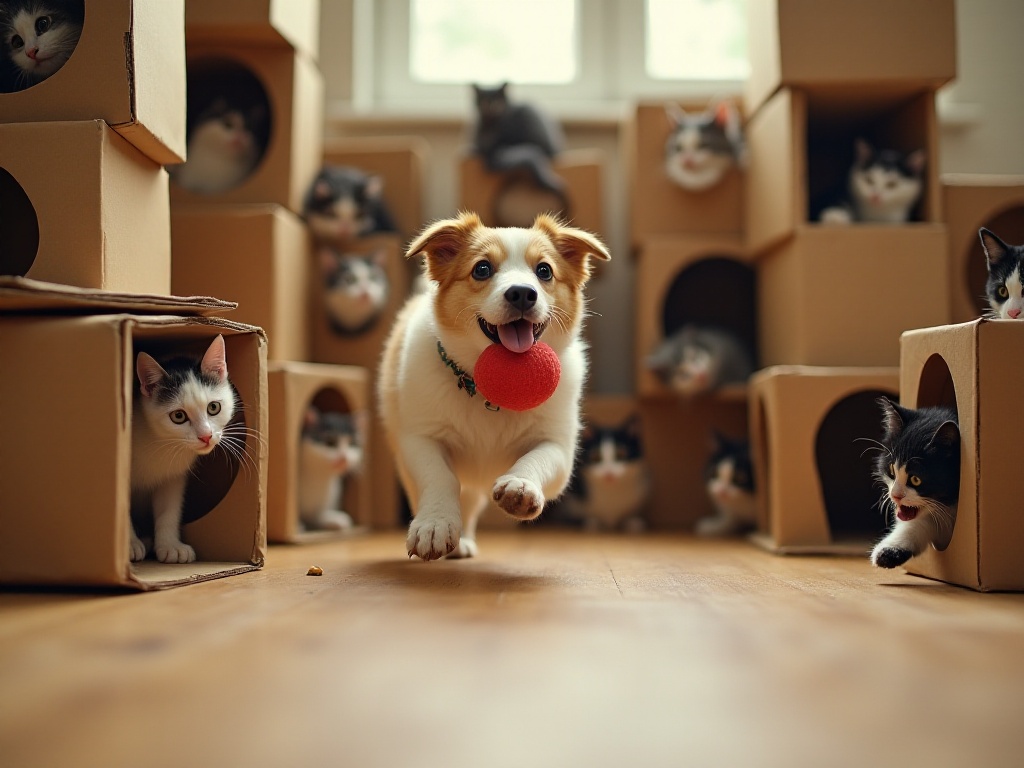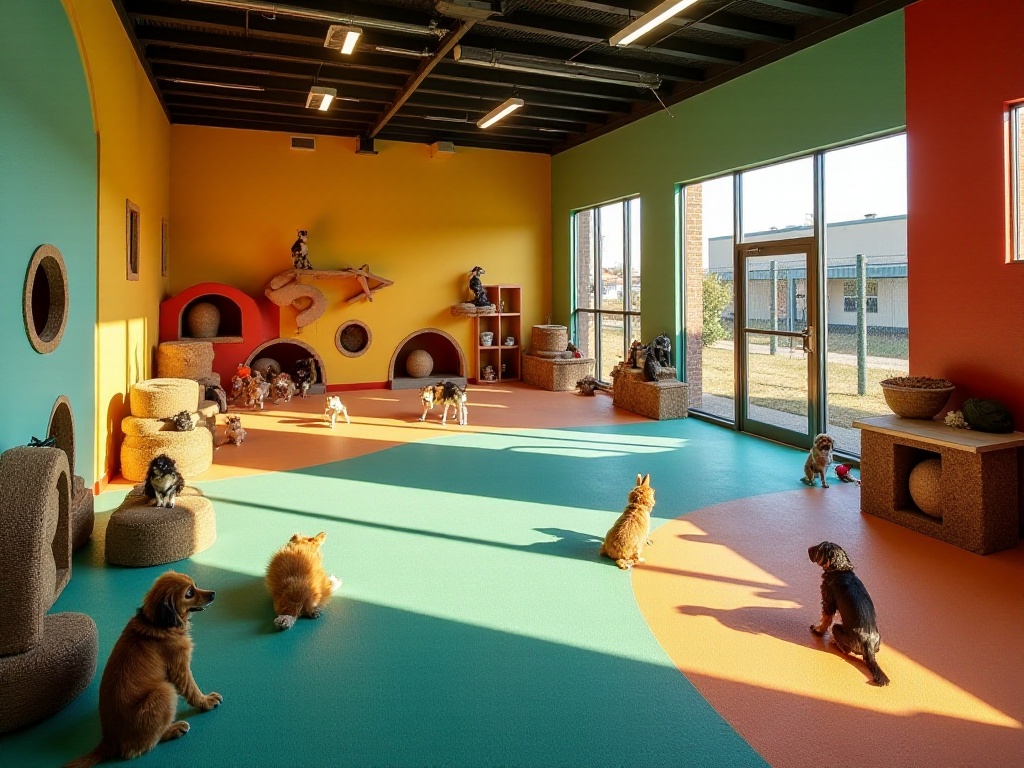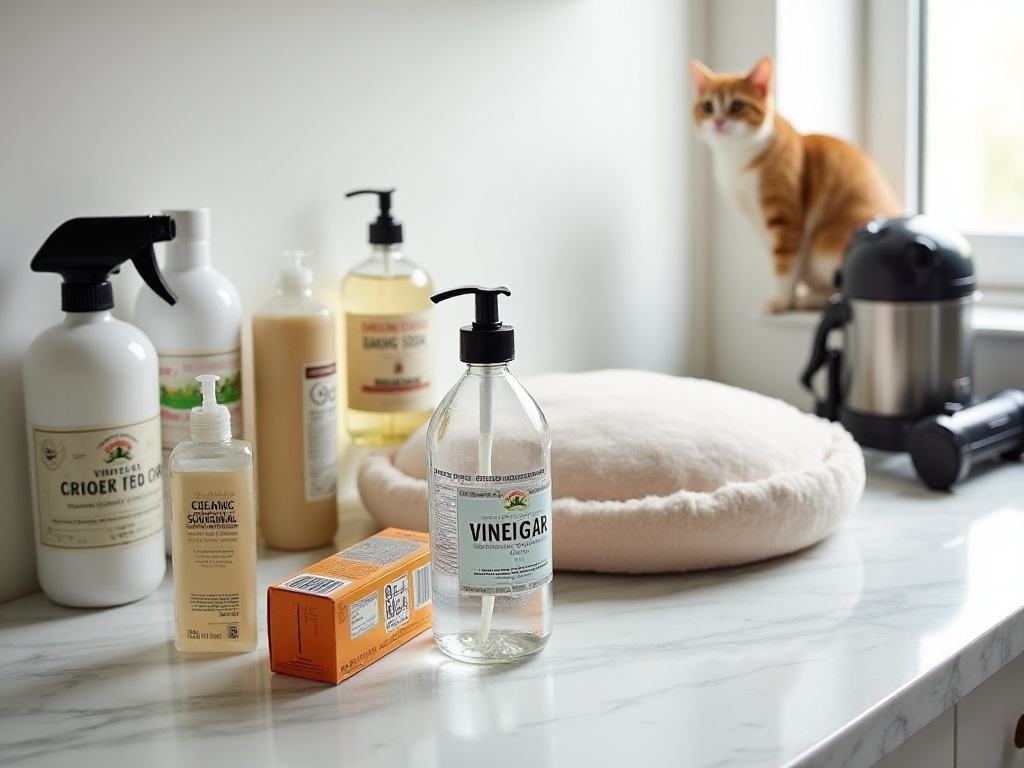Opening Thoughts
Hello everyone! As a veteran pet parent with over ten years of experience, I've been through so much! From bringing home my first puppy to becoming a professional pet parent, the journey has been incredibly interesting. Recently, I've noticed many friends starting to keep pets, and seeing them fumbling around reminds me of my early days. I saw someone post on social media: "Having pets is so difficult!" Actually, it's not that hard! Once you master the right methods, life as a pet parent can be very relaxed and happy!
Health First
When it comes to keeping pets, the most important thing is keeping them healthy! As an experienced pet parent, I can say responsibly that one of the most common mistakes newcomers make is not paying enough attention to their fur babies' health management. Actually, raising pets is similar to raising children - prevention is better than cure is absolutely true.
Let's talk about health checkups first! Many people might think: "My dog/cat looks fine, why do they need checkups?" This thinking is really dangerous! I previously encountered a particularly heartbreaking case where my friend's Corgi was usually active and bouncy, but suddenly one day something wasn't right. When they took him to the hospital, it was already late-stage kidney failure. If they had discovered the problem earlier, the outcome might have been completely different.
So now I strongly recommend that everyone must get regular checkups for their fur babies. Specifically: for pets under one year old, it's best to get checkups every 3-4 months because they develop very quickly during this stage and problems need to be discovered promptly; for adult pets aged 1-7 years, annual checkups 1-2 times are sufficient; for senior pets over 7 years old, it's best to maintain checkups every six months, after all, various health issues tend to emerge with age.
Vaccinations are also particularly important! Speaking of this reminds me of when I first started raising dogs - I thought vaccines were expensive and tried to save money where I could. Then one time after taking my dog to the park, he became lethargic. When we went to the hospital, it was almost canine distemper! Since then, I've never dared to be lazy about vaccines again.
Now I keep the vaccination records in my phone's notes - what vaccines are needed and when to get them are all clearly recorded. For dogs, the basic vaccines include the 6-in-1 vaccine (preventing distemper, parvovirus, etc.) and rabies vaccine; for cats, mainly the 3-in-1 vaccine (preventing feline distemper, rhinotracheitis, and calicivirus) and rabies vaccine. Everyone must vaccinate on schedule and never skip them out of laziness.
Besides regular checkups and vaccinations, daily health observation is also important. For example, you should regularly observe your pet's spirit, appetite changes, bathroom habits, etc. I record their daily food intake and bathroom frequency on my phone, so if anything abnormal occurs, I can discover it immediately.
There's also dental health to consider. Many people might not know that tartar and periodontal disease can not only affect pets' eating but may also lead to heart, kidney, and other internal organ diseases. So I brush my pets' teeth every day. Although they weren't very cooperative at first, they gradually developed the habit. Now they open their mouths voluntarily when they see the toothbrush - it's so cute!
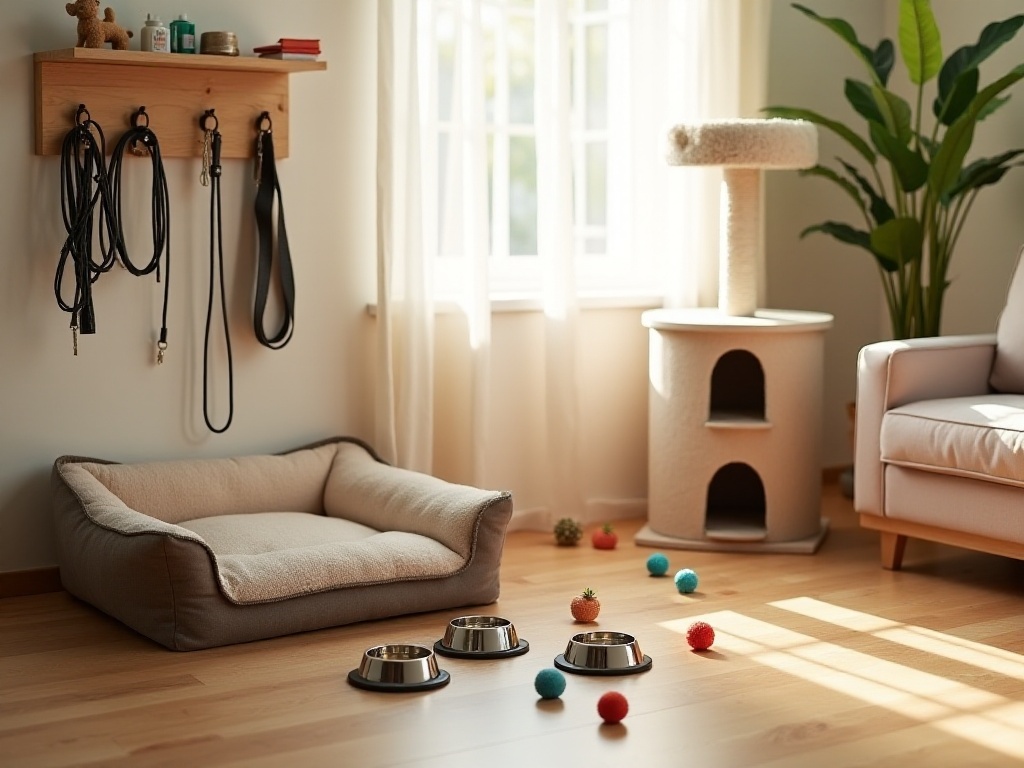
Daily Life Details
When it comes to daily life, there are endless details to pay attention to. Let's first talk about the most basic issue of feeding. I remember when I first started raising dogs, I would feed them whenever they seemed hungry and give water whenever they seemed thirsty. As a result, my dog developed digestive problems pretty quickly. Later, after consulting the vet, I learned that feeding actually requires careful consideration.
For dogs, feeding frequency and portions vary at different stages. Puppies (3-6 months) need to be fed 4-5 times daily because they're growing and need sufficient nutrition; during the juvenile period from 6 months to 1 year, this can be reduced to 3 times daily; after reaching adulthood, maintaining twice daily feeding is fine. However, note that even as adults, large breed dogs should maintain two meals daily to avoid problems like gastric torsion.
As for specific portions, I suggest referring to the recommended amounts on dog food packaging, but don't follow them exactly - adjust according to your dog's size and activity level. For example, my Golden Retriever loves to eat, but because his activity level isn't very high, I control his portions appropriately to prevent obesity.
Feeding cats also has many considerations. Although they look elegant, they're actually very picky about food. First is the water issue - many people might not know that cats are particularly prone to dehydration because they don't have a strong sense of thirst. So I place several water bowls in different locations at home and change and clean them frequently. Many people now recommend using water fountains because cats prefer moving water sources.
Regarding cat food, I recommend combining wet food as the main meal with quality dry food. Since cats are pure carnivores, they need lots of animal protein, and dry food alone might not provide balanced nutrition. However, note that different brands and flavors of cat food should be changed gradually, not suddenly, to avoid digestive issues.
Another issue many beginners often overlook is cleaning feeding utensils. Whether for dogs or cats, their food and water bowls should be washed and sanitized daily. I use special pet dish cleaner and rinse thoroughly with clean water afterward. This not only maintains hygiene but also prevents bacterial infections.
Exercise is also a crucial part of daily life. Dogs need regular, measured exercise, and different breeds have different exercise needs. For example, Border Collies, being highly intelligent and energetic, can develop destructive behaviors if they don't get enough exercise; while short-nosed breeds like Pugs shouldn't exercise too intensely and need to be careful about heat stroke.
My Golden Retriever now gets half an hour to an hour of walks morning and evening, plus some interactive games in between. During walks, I take him to different places to smell new scents and meet new friends, which not only exercises his body but also enriches his life.
Although cats don't need daily walks outside, they still need appropriate exercise. I prepare cat trees, wand toys, and other toys at home and spend time playing with them daily. Many people think indoor cats easily become overweight, but this is mainly due to insufficient exercise. As long as you consistently interact with your cats and keep them active, they can maintain a healthy weight.
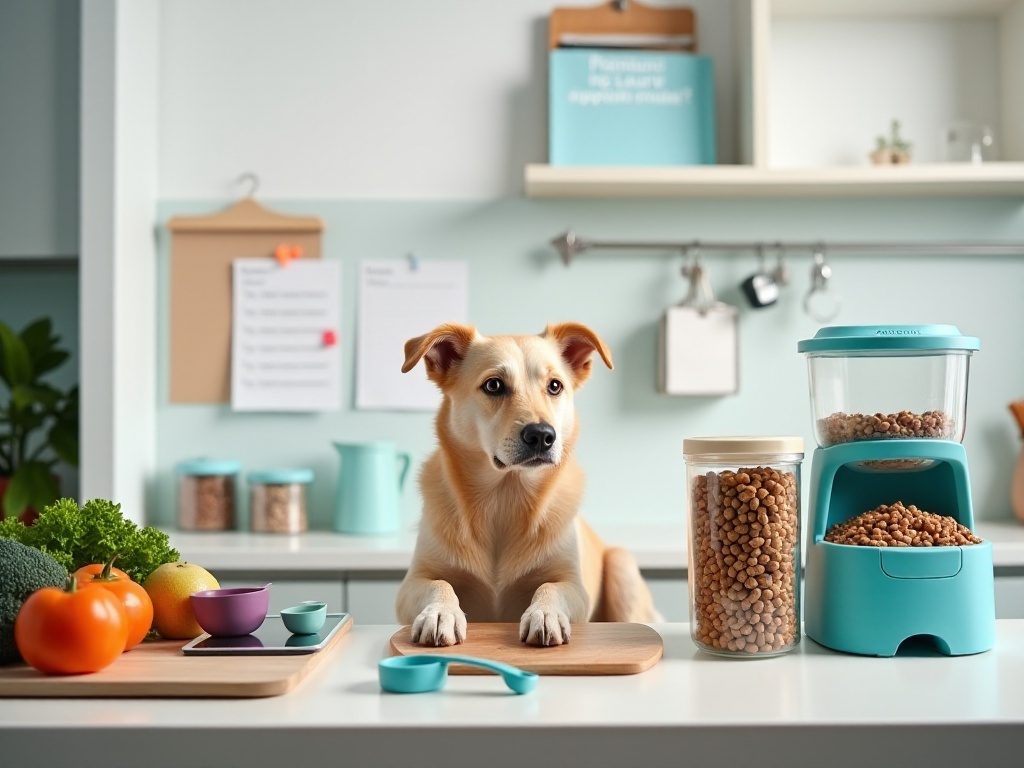
Practical Tips
When raising pets, you'll encounter some headache-inducing problems. For example, one of the most troublesome issues might be pet odors. I used to be very bothered by this, but gradually figured out some useful tricks.
First are urine stains on carpets, which are many pet parents' nightmare. Besides using baking soda and vinegar, I've found that professional enzyme cleaners work particularly well. The specific method is: first absorb the urine with paper towels, then spray on the enzyme cleaner, wait 15-20 minutes for the enzymes to fully break down the proteins in the urine, and finally wipe with a dry towel. This method not only removes odors but also prevents pets from eliminating in the same spot again.
Having pets means cleaning work will definitely be more than usual. I now use a "daily + regular deep cleaning" approach. Daily means using a vacuum cleaner on floors and sofas each day, focusing on areas where pets are most active; weekends involve deep cleaning, including washing floors and pet supplies.
Speaking of washing pet supplies, I've noticed many people don't pay much attention to this. Actually, pets' beds, toys, feeding utensils, and other items need regular washing and sanitizing. I now machine wash what I can, and for items that can't be machine washed, I soak them in warm water with disinfectant before drying. Especially in summer, frequent washing is necessary to prevent bacterial growth.
Then there's the issue of fur cleanup. Whether dogs or cats, shedding is unavoidable. I've tried many methods and found regular brushing + using lint rollers most effective. Now I brush my pets daily, which not only reduces shedding but also helps detect any skin problems early.
Oh, speaking of brushing, choosing suitable brushes is also important. Different fur types need different brushes - for example, long-haired Golden Retrievers need pin brushes and slicker brushes used together, while short-haired cats can use soft bristle brushes. I now have several different brushes at home to use according to different needs.
Seasonal Care
Different seasons indeed require different care for our fur babies. Let's talk in detail about what to watch for in each season.
Summer is one of the most important seasons to pay attention to. First is heat prevention and cooling - besides preparing frozen toys, I also pay special attention to adjusting their schedules. For example, more exercise in the cooler morning and evening hours, and resting indoors during the hot midday sun. I usually keep the air conditioning temperature between 26-28 degrees Celsius, as too low can cause pets to catch cold.
Summer also requires special attention to mosquito prevention. I use pet-safe mosquito repellents at home and regularly apply external parasite prevention medication. There are many specialized pet parasite prevention products on the market now - I recommend consulting a vet before use to choose suitable products.
In autumn, the most important thing is preventing allergies. Because there's more pollen this season, some pets might show allergy symptoms like sneezing and watery eyes. I prepare prevention measures in advance, like avoiding grass during walks and wiping fur with a damp towel after returning home.
In winter, besides keeping warm, preventing dry skin is important. In addition to applying Vaseline to my dog's paws, I also use some pet-specific skincare products appropriately. Also, indoor temperature needs to be controlled to prevent excessive dryness - a humidifier can be helpful.
Spring is the season of renewal, but also when pets easily get sick. With large temperature fluctuations, preventing colds is especially important. I prepare some light blankets to cover them when the weather turns cool. Also, watch out for fleas and ticks, as insects are particularly numerous this season.
During seasonal changes, it's also important to adjust pets' diets. For example, in summer you can slightly reduce food portions and increase water intake; in winter, you might slightly increase portions to help them fight cold. But remember to make changes gradually, not suddenly changing portions dramatically.
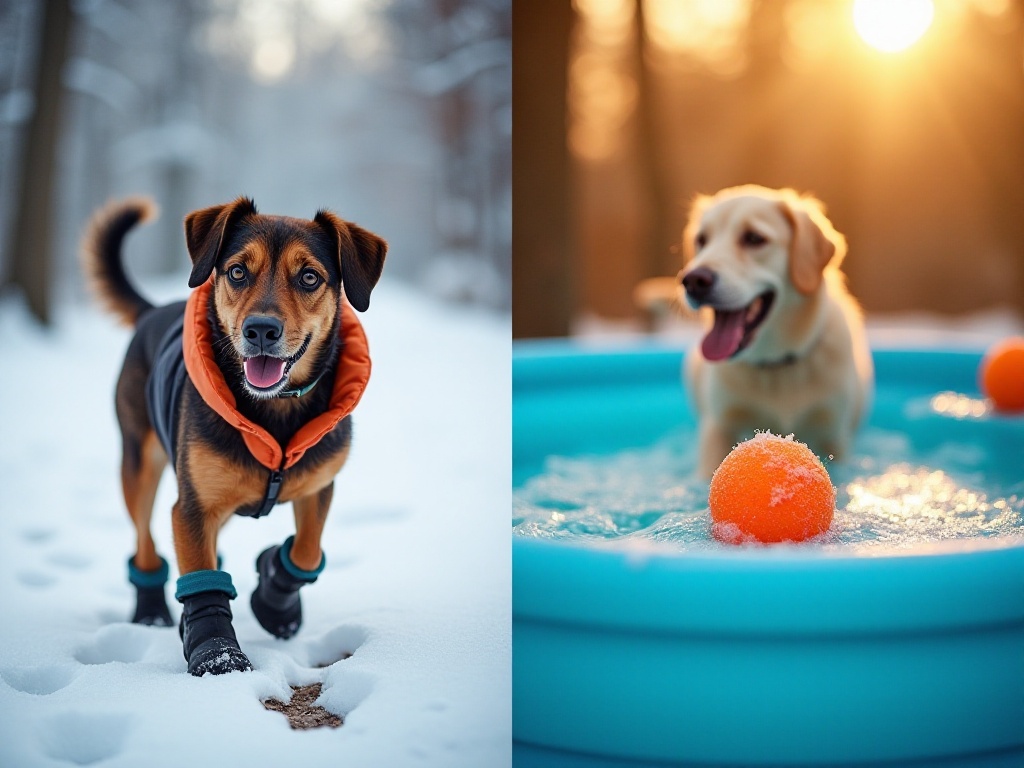
Reflective Conclusion
After writing so much, do you feel that raising pets is really similar to raising children? They all need our careful attention and loving care. Every time I see my fur babies healthy and happy, that sense of achievement is truly indescribable.
Actually, the most important thing about raising pets isn't mastering how many techniques, but having a responsible heart. They dedicate their most beautiful years to us, and we should give them the best care in return. I hope everyone who chooses to keep pets can become a qualified pet parent.
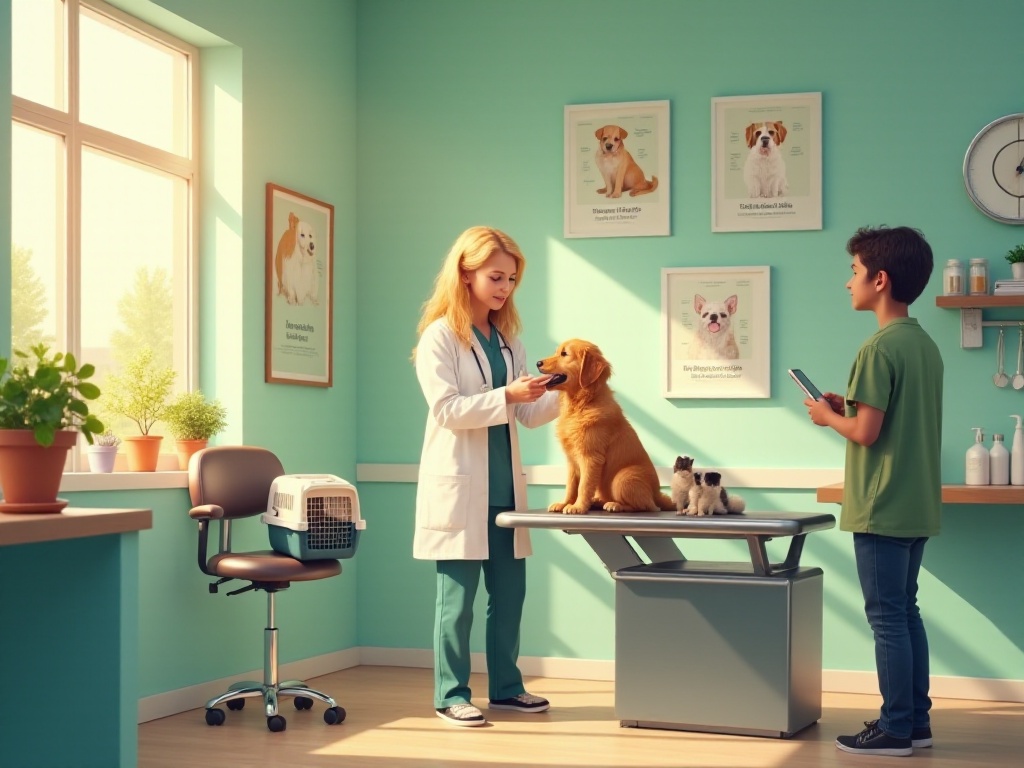
Kind Reminder
Although this article shares many experiences, every pet is a unique individual and may have different situations. If you notice any abnormalities in your fur babies, it's still recommended to seek medical attention promptly and let professional veterinarians diagnose and treat them. After all, their health and safety are most important to us.
I also want to remind everyone that keeping a pet is a long-term commitment that requires our time, energy, and money. Before deciding to keep a pet, carefully consider whether you have sufficient ability and responsibility. If conditions don't allow it temporarily, you can first express your love for animals in other ways, such as becoming a volunteer or supporting stray animals.
Finally, I wish all fur babies health and happiness, and hope every pet parent can find abundant happiness in the process of caring for their pets!
Related articles


